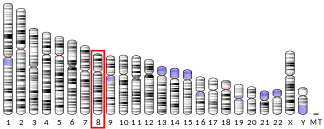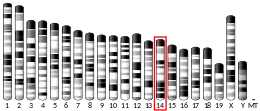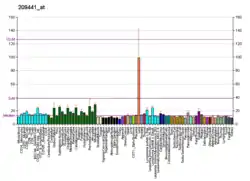RHOBTB2
Rho-related BTB domain-containing protein 2 is a protein that in humans is encoded by the RHOBTB2 gene.[5][6]
RHOBTB2 is a member of the evolutionarily-conserved RhoBTB subfamily of Rho GTPases. For background information on RhoBTBs, see RHOBTB1 (MIM 607351).[supplied by OMIM][6]
Clinical significance
Mutations affecting RHOBTB2 can cause epilepsy, learning difficulties and movement disorders.[7] RHOBTB2-related disorders are autosomal dominant, meaning only one of the two copies of the gene needs to be mutated to cause disease. The mutations usually occur de novo – that is, as a new mutation occurring in the affected individual rather than having been inherited.
References
- GRCh38: Ensembl release 89: ENSG00000008853 - Ensembl, May 2017
- GRCm38: Ensembl release 89: ENSMUSG00000022075 - Ensembl, May 2017
- "Human PubMed Reference:". National Center for Biotechnology Information, U.S. National Library of Medicine.
- "Mouse PubMed Reference:". National Center for Biotechnology Information, U.S. National Library of Medicine.
- Rivero F, Dislich H, Glockner G, Noegel AA (Mar 2001). "The Dictyostelium discoideum family of Rho-related proteins". Nucleic Acids Res. 29 (5): 1068–79. doi:10.1093/nar/29.5.1068. PMC 29714. PMID 11222756.
- "Entrez Gene: RHOBTB2 Rho-related BTB domain containing 2".
- Belal H, Nakashima M, Matsumoto H, et al. (2018). "De novo variants in RHOBTB2, an atypical Rho GTPase, cause epileptic encephalopathy". Hum Mutat. 39 (8): 1070–75. doi:10.1002/humu.23550. PMID 29768694.
Further reading
- Nakajima D, Okazaki N, Yamakawa H, et al. (2003). "Construction of expression-ready cDNA clones for KIAA genes: manual curation of 330 KIAA cDNA clones". DNA Res. 9 (3): 99–106. doi:10.1093/dnares/9.3.99. PMID 12168954.
- Nagase T, Ishikawa K, Suyama M, et al. (1999). "Prediction of the coding sequences of unidentified human genes. XI. The complete sequences of 100 new cDNA clones from brain which code for large proteins in vitro". DNA Res. 5 (5): 277–86. doi:10.1093/dnares/5.5.277. PMID 9872452.
- Hamaguchi M, Meth JL, von Klitzing C, et al. (2002). "DBC2, a candidate for a tumor suppressor gene involved in breast cancer". Proc. Natl. Acad. Sci. U.S.A. 99 (21): 13647–52. doi:10.1073/pnas.212516099. PMC 129730. PMID 12370419.
- Ramos S, Khademi F, Somesh BP, Rivero F (2003). "Genomic organization and expression profile of the small GTPases of the RhoBTB family in human and mouse". Gene. 298 (2): 147–57. doi:10.1016/S0378-1119(02)00980-0. PMID 12426103.
- Strausberg RL, Feingold EA, Grouse LH, et al. (2003). "Generation and initial analysis of more than 15,000 full-length human and mouse cDNA sequences". Proc. Natl. Acad. Sci. U.S.A. 99 (26): 16899–903. doi:10.1073/pnas.242603899. PMC 139241. PMID 12477932.
- Gerhard DS, Wagner L, Feingold EA, et al. (2004). "The status, quality, and expansion of the NIH full-length cDNA project: the Mammalian Gene Collection (MGC)". Genome Res. 14 (10B): 2121–7. doi:10.1101/gr.2596504. PMC 528928. PMID 15489334.
- Siripurapu V, Meth J, Kobayashi N, Hamaguchi M (2005). "DBC2 significantly influences cell-cycle, apoptosis, cytoskeleton and membrane-trafficking pathways". J. Mol. Biol. 346 (1): 83–9. doi:10.1016/j.jmb.2004.11.043. PMID 15663929.
- Chang FK, Sato N, Kobayashi-Simorowski N, et al. (2007). "DBC2 is essential for transporting vesicular stomatitis virus glycoprotein". J. Mol. Biol. 364 (3): 302–8. doi:10.1016/j.jmb.2006.09.026. PMC 1713265. PMID 17023000.
- Yoshihara T, Collado D, Hamaguchi M (2007). "Cyclin D1 down-regulation is essential for DBC2's tumor suppressor function". Biochem. Biophys. Res. Commun. 358 (4): 1076–9. doi:10.1016/j.bbrc.2007.05.037. PMC 1934618. PMID 17517369.
- Collado D, Yoshihara T, Hamaguchi M (2007). "DBC2 resistance is achieved by enhancing 26S proteasome-mediated protein degradation". Biochem. Biophys. Res. Commun. 360 (3): 600–3. doi:10.1016/j.bbrc.2007.06.127. PMC 1986727. PMID 17617377.
- Ohadi M, Totonchi M, Maguire P, et al. (2007). "Mutation analysis of the DBC2 gene in sporadic and familial breast cancer". Acta Oncologica. 46 (6): 770–2. doi:10.1080/02841860601047752. PMID 17653899. S2CID 33646131.
This article is issued from Wikipedia. The text is licensed under Creative Commons - Attribution - Sharealike. Additional terms may apply for the media files.




